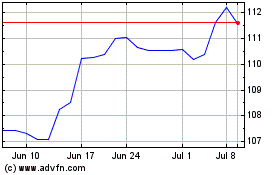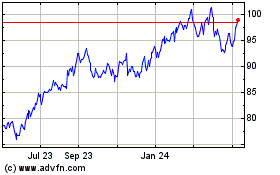By Sarah Nassauer
Target Corp. posted the strongest quarterly growth in its
history, including a near tripling of digital sales, as coronavirus
concerns fueled demand for services that let shoppers pick up goods
in parking lots or skip trips to the store.
Like rival Walmart Inc., Target has benefited from being able to
stay open throughout the pandemic as well as selling groceries and
other household staples. Online comparable sales rose 195% from a
year ago, driven by same-day pickup and delivery services. Walmart
said Tuesday its e-commerce revenue nearly doubled in the latest
quarter.
Chains that had to temporarily close stores or don't sell food
have struggled. TJX Cos., the parent of off-price chains T.J. Maxx,
HomeGoods and Marshalls, said quarterly sales fell 32% as its
stores were closed for nearly a third of the quarter due to the
Covid-19 pandemic. The discounter has a limited e-commerce
operation.
Shares of Target jumped 8% in premarket trading to new highs,
while TJX shares slid 5%.
Target's comparable sales, those from stores and through digital
channels operating for at least 12 months, rose 24% in the quarter
ended Aug. 1, a company record and twice as much as in the May
quarter. Target executives cited broad gains across categories such
as food, electronics and home goods and a rebound in clothing
sales.
"In the current environment, each of our categories are
performing very well," CEO Brian Cornell said on a call with
reporters. The Minneapolis company estimated it has taken about $5
billion in sales from competitors since the start of the year.
Government stimulus checks and extra unemployment benefits are a
factor, Mr. Cornell said, "but even as the stimulus waned, we
continued to see strong growth." So far comparable sales in August
are up low double digits, he said. Walmart executives said sales
moderated in July as benefits were reduced.
U.S. consumer retail spending collapsed in March and April when
restrictions to stem the spread of Covid-19 required many stores to
shut. Government data has recorded three straight months of
spending gains at restaurants and stores as many businesses
reopened.
Big chains such as Target, Walmart and Home Depot Inc., along
with e-commerce giant Amazon.com Inc., have been among the biggest
beneficiaries of new shopping habits and increased spending on
homes and food. On Wednesday, Lowe's Cos. posted surging sales
figures for the May-to-July earnings period.
Walmart's U.S. comparable sales rose 9.3% in the most recent
quarter, bringing its global revenue to $137.7 billion. Home Depot
said U.S. comparable sales rose 25%, and total revenue, including
in Mexico and Canada, reached $38 billion in the quarter. Lowe's
comparable sales grew by 35.1% in the U.S., and total sales
increased to $27.3 billion from $21 billion.
Target, which operates about 1,900 stores, is smaller than those
two companies. Its total revenue reached $22.9 billion in the
quarter, compared with $18.4 billion a year earlier. Sales through
digital channels accounted for 17% of revenue, around $3.9
billion.
Smaller chains and traditional department stores, many forced to
close during the early days of the pandemic, aren't faring well.
Lord & Taylor, J.C. Penney Co. and Stage Stores Inc. have all
filed for bankruptcy protection since May. Last week, off-price
chain Stein Mart Inc. filed for chapter 11 with plans to close most
of its roughly 280 stores.
TJX struggled to stock enough goods after an initial surge of
shoppers when it reopened many of its closed stores. The company
said it has reopened more than 4,500 stores world-wide.
The company had planned lower inventory levels to facilitate
social distancing, but sold more than expected goods at reopened
stores and encountered supply-chain and logistics challenges as
operations ramped up, TJX said.
TJX said traffic and sales moderated as it moved into August due
to consumer behavior and demand related to Covid-19, as well as
lighter inventories in stores than planned.
Comparable-store sales for days the stores were open fell 3% in
the quarter ended Aug. 1 from a year ago. By that measure, the
company expects to fall by 10% to 20% for the third quarter.
On Tuesday, Kohl's Corp., which temporarily closed its
department stores in the spring, said revenue fell 23% to $3.4
billion for the quarter ended Aug. 1. Kohl's said sales rebounded
in June but tapered off again in July as the coronavirus surged in
parts of the country.
For Target, sales of higher-margin goods such as apparel helped
boost profits, offsetting coronavirus-related expenses such as
higher wages and cleaning costs. Net income increased 80% compared
with last year, hitting $1.7 billion and beating Wall Street's
expectations.
Target said it plans to lengthen the traditional back-to-school
shopping season, making school supplies available throughout the
fall. Target said it thinks around two-thirds of American students
are starting the year learning online without clarity on when
in-classroom teaching will resume. "We want to extend the season,"
Mr. Cornell said, "and be ready."
Write to Sarah Nassauer at sarah.nassauer@wsj.com
(END) Dow Jones Newswires
August 19, 2020 09:37 ET (13:37 GMT)
Copyright (c) 2020 Dow Jones & Company, Inc.
TJX Companies (NYSE:TJX)
Historical Stock Chart
From Mar 2024 to Apr 2024

TJX Companies (NYSE:TJX)
Historical Stock Chart
From Apr 2023 to Apr 2024
